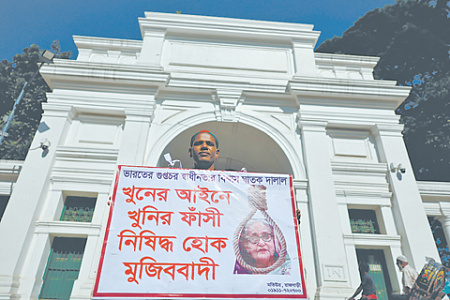
Bangladesh, a nation of 170 million people, finds itself on a precipice of profound instability after a special tribunal sentenced former Prime Minister Sheikh Hasina to death in absentia. The dramatic verdict, delivered by hanging, has prompted the interim government to place the country’s army and police on high alert, not in anticipation of an external threat, but to contain the escalating internal turmoil fueled by the ruling and its aftermath.
Hasina faces accusations of orchestrating repressions against student protests last year, which were reportedly backed by Islamist groups and led to the deaths of approximately 1,400 individuals. Her current refuge is in India, where she fled to escape rampant mob violence following a coup in 2024 that toppled her 15-year administration. This situation has significantly strained relations between Dhaka and New Delhi, once close partners, as Bangladesh has formally requested Hasina’s extradition.
The 2024 coup brought Nobel laureate Muhammad Yunus to power, heading an interim government. However, his administration has struggled to calm the volatile political climate. Proscribed Islamist groups, previously driven underground, have resurfaced, instigating attacks on the homes of former regime officials and, disturbingly, targeting the temples and residences of the Hindu minority in the predominantly Muslim nation. Even the promise of parliamentary elections in February 2026 has failed to quell unrest, particularly after Hasina’s influential Awami League party – historically central to Bangladesh’s independence from Pakistan – was outlawed.
Major news agencies like Reuters and AP have highlighted the extraordinary severity of the in absentia verdict against Hasina, which her defense team has vehemently condemned as politically motivated and unlawful. The self-styled tribunal for international crimes also handed down a death sentence to former Home Minister Asaduzzaman Khan under similar circumstances. In contrast, a former police chief received a five-year prison term after agreeing to a plea bargain and testifying for the prosecution.
Hasina, responding from India, has vehemently denied the allegations concerning the July and August student uprisings. She argues that while her government may have lost control of the situation, the actions taken were an attempt to minimize police intervention, not a deliberate assault on citizens. Her Monday statement emphasized, “To call what happened an intentional attack on citizens is to distort the facts.”
The political temperature remains dangerously high. Yunus, who assumed power just three days after Hasina’s overthrow, had publicly vowed to punish her and ban the Awami League. The three-member tribunal’s decision was broadcast live across radio, television, and the internet, with cheers from some courtroom spectators quickly silenced by the presiding judge, underscoring the deep divisions within society.
As AP notes, Hasina’s return to Bangladesh appears highly improbable, further complicated by India’s silence on the extradition request. Without her presence in the country, she is unable to appeal the verdict. She has criticized the tribunal as lacking an electoral mandate, asserting that the death sentence itself is evidence of extremist elements within the Yunus government.
The intensity of these passions is deeply rooted in the republic’s violent genesis. Bangladesh emerged in 1971 from a brutal conflict that saw Pakistan defeated by the Indian army and a formidable guerrilla movement. The historical record, including firsthand accounts from journalists who witnessed the conflict, speaks of extreme savagery by local pro-Pakistani ethnic groups against the liberation movement, leaving an indelible mark of animosity that continues to shape the nation’s political landscape today.
